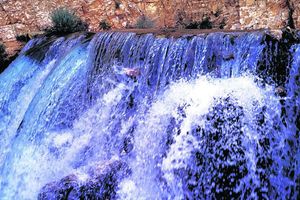It is surely understandable why the Lord Jesus experienced terrible, raging thirst while he hung on the cross.
He had suffered much blood loss; and also, before the unusual noontime darkness when ‘the sun’s light failed’ (Luke 23:45) (or ‘was eclipsed’, margin), he had been hanging in the fierce heat, as the sun beat down on a cloudless Middle Eastern day.
Need
Thirst is one of the most unpleasant, uncomfortable and, if left, fatal of human conditions. The Lord Jesus experienced this on the cross. In his extremely dehydrated state he expressed his need — ‘I thirst’ (John 19:28).
John notes that Jesus’ expression of physical need, ‘I thirst’, was ‘to fulfil the Scripture’ (John 19:28). Some 1000 years previously, the ‘Calvary psalm’ had foretold Christ’s thirst.
David, under the inspiration of the Holy Spirit, was enabled to give an ‘insider’s view’ of Calvary with the words, ‘I am poured out like water, and all my bones are out of joint, my heart is like wax, it is melted within my breast; my strength is dried up like a potsherd, and my tongue cleaves to my jaws; thou dost lay me in the dust of death’ (Psalm 22:14-15).
Scripture also records that some compassionate, anonymous person — possibly a soldier — took it upon himself to try to alleviate Jesus’ thirst: ‘And one of them at once ran and took a sponge, filled it with vinegar, and put it on a reed, and gave it to him to drink’ (Matthew 27:48).
This also was a fulfilment of Scripture, for in Psalm 69:21 we read: ‘For my thirst they gave me vinegar to drink.’
Physical thirst
There were those in the early church who denied that Christ was truly human. They were known as ‘Docetists’, from the Greek verb ‘to seem’. Christ only seemed to be human, they taught.
Christ’s intense thirst, however, reveals that his humanity was real. In Christ, God became man. ‘In him the whole fullness of deity dwells bodily’ (Colossians 2:9). Scripture reveals his real humanity as much as his absolute deity.
The Gospel records show that Christ wept (John 11:25), showing he had human emotion, and that Christ slept (Mark 4:38). John 4:6 reveals that he experienced fatigue: ‘Jesus, wearied as he was with his journey, sat down beside the well’.
Jesus also experienced the psychological pain of mockery and ridicule (Matthew 27:31ff.). Our title verse shows that he experienced physical thirst.
From all this evidence revealing Christ’s real humanity, we can state that in Christ we have a God who really does understand what it is like to be human.
In Christ we have a sympathetic Saviour, well acquainted with physical, psychological, social and spiritual suffering. ‘For we have not a high priest who is unable to sympathise with our weakness, but one who in every respect has been tempted as we are, yet without sin’ (Hebrews 4:15).
Our fellow-sufferer yet retains
A fellow-feeling of our pains
And still remembers in the skies
His tears, His agonies and cries.
In every pang that rends the heart,
The Man of Sorrows had a part,
He sympathises with our grief
And to the sufferer sends relief
(Michael Bruce, 1746-67).
Spiritual thirst
‘I thirst’. We can consider Christ’s word of need on more than just a physical level. Thirst refers to a desire and craving. Thirst can be more than physical.
The Bible reveals the phenomenon of spiritual thirst: the thirst of the soul; the desire for fellowship with God our maker; the desire to realise our chief end, which is ‘to glorify God and to enjoy him for ever’.
Hence the psalmist could write: ‘As a hart longs for flowing streams, so longs my soul for thee, O God. My soul thirsts for God, for the living God’ (Psalm 42:1-2) and, ‘My soul thirsts for thee; my flesh faints for thee as in a dry and weary land where no water is’ (Psalm 63:1-2).
Christ, the eternal Son of God, had enjoyed exquisite fellowship with his Father in eternity past, along with the joy of unalloyed fellowship with his Father during the whole of his life on earth — up until now.
But, on the cross, when he bore our sins and God’s anger on them, he was momentarily cut off from the unblemished fellowship with his Father that he had always known. Sin separates us from God. ‘Your iniquities have made a separation between you and your God, and your sins have hid his face from you’ (Isaiah 59:2). When our sins were imputed to Christ, he was separated from his Father.
Christ thus experienced an intense spiritual thirst on the cross, as well as a physical one. He thirsted for the fellowship with his Father which he had lost. And he thirsted, so that the believing sinner will never suffer spiritual thirst.
Substitution
The ultimate in spiritual thirst is hell itself. Hell, amongst other things, is a thirst that will never be quenched for all eternity.
Jesus once told of a man in hell who desired someone ‘to dip the end of his finger in water and cool my tongue; for I am in anguish in this flame’ (Luke 16:24). The thirst of hell truly made it ‘this place of torment’ (Luke 16:28) for that condemned man.
On the cross Christ experienced hell in the sinner’s place, so that we might go at last to heaven. On the cross, Christ thirsted. He thirsted so that a fountain of living water could be opened for thirsty sinners.
Trusting the crucified Christ sees our sins forgiven and fellowship with God restored. Trusting Christ means having our spiritual thirst quenched for time and eternity. On Calvary Jesus thirsted, to save sinners from eternal thirst.
Jesus still extends the promise to sinners: ‘If any one thirst, let him come to me and drink. He who believes in me, as the Scripture has said, “Out of his heart shall flow rivers of living water”’ (John 7:37-38).
The closing verses of the Bible hold out a wonderful invitation to all who are aware of their spiritual thirst. The invitation is, come to Jesus and drink! ‘Let him who is thirsty come; let him who desires take the water of life, without price’ (Revelation 22:17).
Salvation entails deliverance from the thirst of hell. Paradoxically, just as the ‘light of the world’ (John 8:12) experienced darkness at Calvary, so that sinners might live in God’s eternal light, likewise, on the cross, Jesus cried ‘I thirst’. He did so that the sinner’s thirst might be quenched for ever.
I heard the voice of Jesus say
‘Behold, I freely give
The living water — thirsty one
Stoop down and drink and live!’
I came to Jesus and I drank
Of that life-giving stream:
My thirst was quenched, my soul
revived
And now I live in Him
(Horatius Bonar, 1808-89).
Timothy Cross










